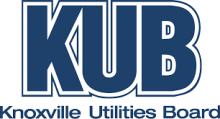
Fast, affordable Internet access for all.

With the Tennessee Valley Authority (TVA) and the state’s Comptroller’s office recent approval of the Knoxville Utilities Board (KUB) business plan, the city-owned utility proposal to build a Fiber-to-the-Home (FTTH) network in the Volunteer State’s third-largest city is set to take the next step.
Tonight, KUB will hold a hearing to get public input on KUB’s plan to bring high-speed Internet service to its 210,000 customers spread out across Knoxville, Knox County, and small parts of seven neighboring counties.
If the KUB Board of Commissioners approves the final plan, along with a needed two-thirds majority support from the Knoxville City Council, network construction could start sometime next year and would take about seven years to build out.
But it won’t come cheap. “We project that the cost to build out the network and ultimately staff and operate that network, estimated cost is about $500 million over the first ten years of operation of the business line,” KUB Vice President Jamie Davis told WATE 6 News.
Funds to construct the network would come in part from a 3 percent annual rate increase on KUB electric customers from 2022-2025. After 2025, KUB electric customers would see an estimated increase of $10.50 in their monthly electric bill, according to Knox News.
And the Survey Says…

It remains to be seen whether KUB customers will balk at the cost. Currently, as reported by WBIR 10News, a KUB survey found that about 60% of their electric customers have only one option for Internet service, while 50% said they would switch from their current Internet Service Provider (ISP) to KUB’s fiber network when, and if, it is built and lit up for service. That may be due, in part, because of the well-known success of Chattanooga’s municipal network, EPB Fiber, which served as inspiration for KUB’s plan. A recent independent study of EPB Fiber found that the celebrated city-owned fiber network has delivered Chattanoogans a $2.69 billion return on investment in its first decade.
However, KUB spokesperson Stephanie Midgett attributed the positive survey results to a pandemic-induced realization of the necessity for reliable high-speed Internet service. “During the pandemic, when the need for remote learning and remote work rose so quickly, the demand for high-speed Internet did as well. Gaps in current service became evident, especially in rural areas," Midgett told Knox News.
Jamie Taylor is one KUB customer chomping at the bit to get fiber connectivity.
“There was nothing available (in the area),” which is why many households seemed to depend on unreliable satellite-based providers, Taylor told WATE 6 News, adding that she was never given an explanation by the incumbent providers why she couldn’t get service at her family’s address.
When the pandemic forced her family into the remote work and learning world, her oldest child couldn’t use the school-supplied hotspot for online video calls and her husband, who needed to work from home, was also hindered by poor connectivity.
KUB is in the process of deploying 300 miles of fiber to connect the utility’s electric substations, part of its meter modernization program that uses a combination of wireless and fiber technologies to improve its electric distribution system. That work is expected to be completed by 2026. As KUB gets to work on modernizing its system, the utility plans to build excess capacity, laying the groundwork to eventually offer fiber-driven Internet, phone and TV services.
In advance of tonight’s public hearing, Taylor said, “I may like shoot them (KUB) an email or something to let them know we’re definitely interested and support that.”
Inline image from Wikimedia Commons user Brian Stansberry CC by 3.0

